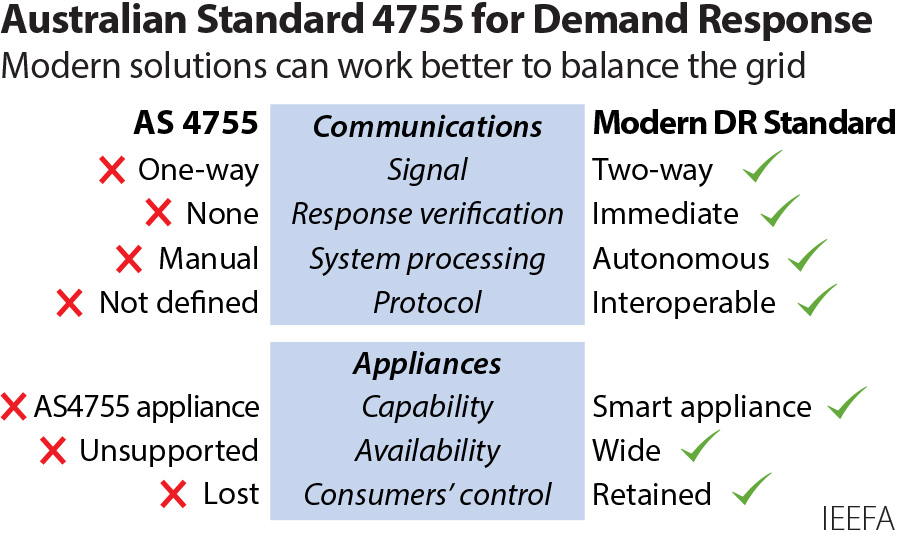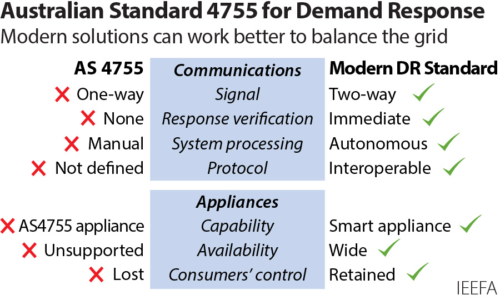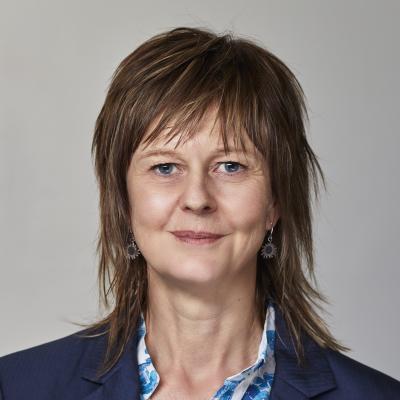IEEFA: Enforcing outdated Australian-only demand response standard not in consumers’ long term interest

5 August 2021 (IEEFA Australia): Mandating a new Australian standard for pool pumps, air conditioners, electric storage water heaters and electric vehicle chargers will consign households to outdated technology, finds a new report by the Institute for Energy Economics and Financial Analysis (IEEFA).

Australia’s Energy Ministers have decided that various domestic appliances sold in the country must provide demand response capabilities, and will only accept solutions offering the unique interface detailed in the AS4755 series of Australian Standards.
The problem is, says author of the report Dr. Gabrielle Kuiper, that rather than leaving the market free to offer a range of different demand response solutions, the Ministers’ mandated appliances must support a single unique interface prescribed in the AS4755 series of Australian Standards, available nowhere else in the world.
No hot water heater, pool pump controller or EV charger manufacturer offers products supporting the standard
“Despite AS4755 being available for over a decade, no hot water heater, pool pump controller or EV charger manufacturer offers products supporting the standard,” says Dr. Kuiper.
“A better option for the Ministers would be to allow manufacturers to use already available, widely used, and well-supported international demand response standards. Some of these alternate solutions have already been successfully used in Australia.”
The Australian government’s timeline for compliance to the new standard is aggressive, with AC and hot water manufacturers required to offer appliances with distributed energy capabilities by 1 July 2023, swimming pool pump controllers by 1 July 2024, and EV chargers/dischargers by 1 July 2026.
“Manufacturers are being asked to offer solutions that meet requirements specified in the AS4755 series of demand response standards, a unique Australian-only standard that is unsupported, unverifiable and incompatible with best practice demand response,” says technical consultant and co-author Dr. Martin Gill.
“Consumers already have concerns about handing over control of their energy appliances to third parties. Mandating AS4755 does nothing to alleviate those concerns.”
Consumers have concerns about handing over control of their energy appliances to third parties
Demand response is used around the world to enable energy distributors to better manage demand and supply of electricity. For households, it means having the option to change their power consumption and onsite generation.
“Numerous demand response standards and techniques exist globally, giving households the option to choose one that best suits their needs,” says Dr. Kuiper.
“These international solutions recognise that households own the appliances and ensure consumers retain control, including override and opt-in and opt-out. They also support future ‘pay for response’ requirements by allowing validation of demand response benefits.
“Adoption of international best practice solutions would ensure that consumers in Australia are well placed to maximise return on their investments in distributed energy resources.
“In contrast, the AS4755 Australian standard has not been adopted anywhere in the world and allows the use of undefined protocols raising serious questions about interoperability and making independent compliance certification impossible.
The AS4755 Australian standard has not been adopted anywhere in the world
“Appliance manufacturers should be allowed to offer widely supported international demand response standards.
“Doing so offers Australian consumers a far better outcome, where they may earn greater income from future demand response programs and markets.”
Dr. Kuiper and Dr. Gill are recommending Energy Minsters reconsider the mandate of the AS4755 Standard.
“Instead of AS4755, Energy Ministers need to legislate for priority appliances to support ‘a demand response capability’,” says Dr. Gill.
“This leaves manufacturers, and the market, free to offer a range of different solutions that are already available, rather than locking Australia into an unsupported solution which is already out-of-date.
“Energy Ministers should ensure that offered solutions allow consumers to retain control (or override), are certified to be interoperable, and support verification and validation over secure two-way communications.”
Media contact: Kate Finlayson ([email protected]) +61 418 254 237
Author contacts: Dr. Gabrielle Kuiper ([email protected]) and Dr. Martin Gill ([email protected])
About IEEFA: The Institute for Energy Economics and Financial Analysis (IEEFA) examines issues related to energy markets, trends, and policies. The Institute’s mission is to accelerate the transition to a diverse, sustainable and profitable energy economy. (www.ieefa.org)













